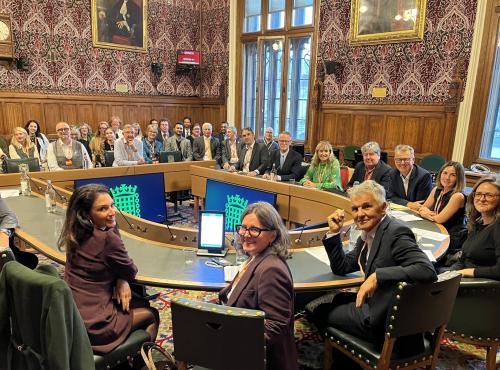The Budget and Spending Review: reactions from the APPG for Skills, Careers and Emplyoment
The All-Party Parliamentary Group for Skills, Careers and Employment hosted an event discussing the Budget and Spending Review on Wednesday 3rd November. Hosted by the Rt Hon. Lord Norton of Louth and the Rt Hon. Baroness Garden of Frognal, we also had the pleasure of hosting a number of key members of the sector discussing the impact of the Spending Review on education and skills.
Panel speakers included
- Paul Warner, Director of Strategy & Business Development at the Association of Education and Learning Providers;
- Bhavina Bharkhada, Head of Policy and Campaigns at Make UK;
- Professor Karl Dayson, Pro-Vice Chancellor for Research & Innovation at the University of Salford;
- Tabitha Roberts, Policy Manager at the Edge Foundation; and
- Beatrice Barleon, Head of Public Affairs and Policy at EngineeringUK.
The discussion covered a variety of topics raised by the Spending Review and potential developments missing from it.
On skills, the panel, chairs, and attendees all noted that the budget provided an evolution to what was already in place. The settlement was progressive, and focused on consolidating the key areas such as careers, apprenticeships, T-levels, and key skills such as numeracy. Some of what was within the Spending Review confirmed previous announcements, such as the Institutes of Technology Wave 2 funding. Some of these settlements were limited, such as around the exclusion of literacy or digital key skills funding in favour of the numeracy Multiply programme. There was also some concern around how some of the investment would be spent: key considerations such as teaching salaries and other inflating costs of education are likely to take precedence over direct investment in young people’s future, meaning that the potential for development of some services is limited by the current financial context of education providers.
One key area missing in the review was green skills. The potential for the economically transformative nature of a green skills revolution was omitted, including around specific recommendations such as the green skills tax credit proposed by Make UK. In addition, with the tax cut on domestic flights, green issues felt like a significant omission to a number of the attendees.
Careers was a focus in the discussion, although a number of attendees noted the limited nature of the careers interventions proposed within the Spending Review. Development within the Spending Review of careers guidance was focused on job coaches in the Department for Work and Pensions, but attendees highlighted that careers guidance can and should be broad – enabling young people, in particular, to understand the long-term opportunities for careers in less understood areas, such as engineering. Information, advice and guidance was highlighted as a key mechanism to address many issues, such as gender biases in recruitment.
Apprenticeships also were discussed in depth, although it was noted that the Spending Review did not fundamentally change many of the challenging areas of provision, including on funding, with no significant changes to the function of the levy. Approaches that the Treasury might consider in the future included looking at uses for unspent levy funds, noting that using it to supplement wages had been excluded previously. However, upcoming issues around the levy were predicted, with Covid-19 having meant that the National Audit Office prediction of a shortfall in funding had not yet materialised, with attendees suggesting solutions to this issue including ringfencing funding targeted towards specific areas (geographic community or by sector) requiring the support most.
One key issue excluded from the Spending Review was the response to the Augar review. As such, the higher education student fee funding settlement and any detail on the funding of teaching in higher education was not covered, awaiting the final announcements from the Department for Education.
Research and development in higher education was an area of concern. While the Spending Review maintained or improved many of the commitments previously trialled, such as five years of funding for the Advanced Research & Invention Agency (ARIA), increases to research funding agencies such as Innovate UK, and the R&D Tax Credit programme’s scope increasing, attendees noted concern around the delay to research and development funding. While the Chancellor has maintained the £22bn R&D spending target set in the 2020 Budget, it has pushed the delivery date back two years to 2026/27. The Higher Education Commission will be providing recommendations in this area of research and innovation expenditure, including on how the uplift can be spent in order to help level up the UK’s regions and reduce inequalities.
While there were many areas where attendees felt there were details or practical steps omitted by the Spending Review, the group felt glad at the number of initiatives that have received or will continue to receive support around education, skills, and careers. The Group’s membership were committed to help ensure support in place can be used effectively, challenge where initiatives require constructive criticism, and highlight where future budgetary settlements can work for everyone.



